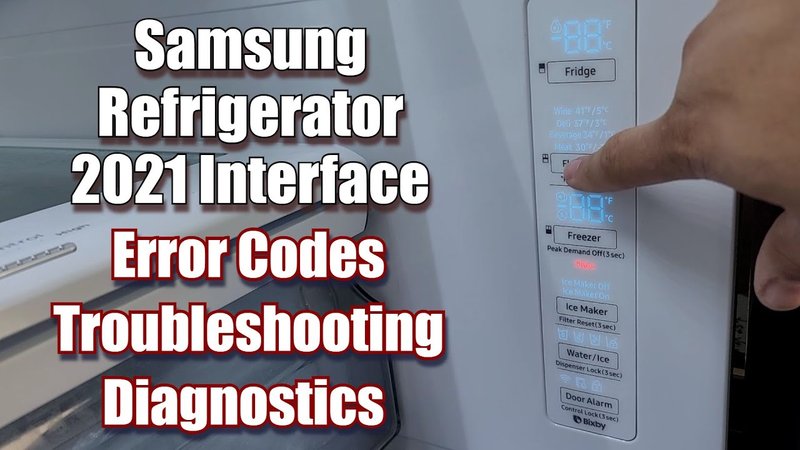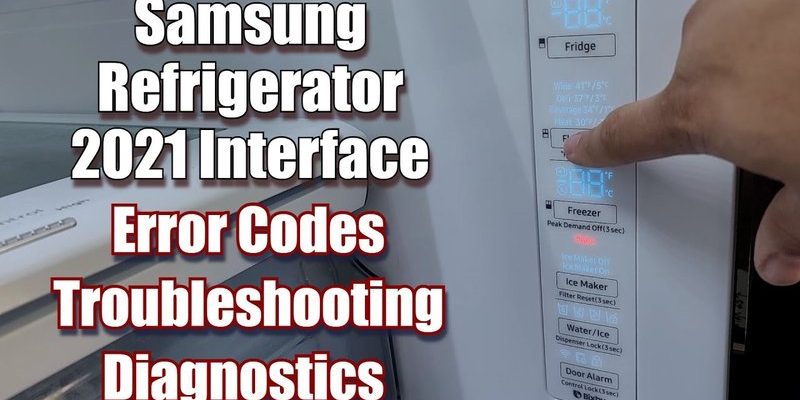
The F2 error code is Samsung’s way of indicating that there’s an issue with the fan motor in your refrigerator. Think of it like your car’s engine light coming on; it’s a signal that something’s not quite right. While it might be tempting to ignore it and hope it goes away, that’s usually not the best approach. Your refrigerator’s fan plays a crucial role in maintaining the proper temperature, and when it’s not functioning correctly, it could lead to bigger problems, like spoiled food or increased energy bills.
Understanding the Role of the Fan Motor
Before diving into whether you need a technician, it helps to understand what the fan motor does. Imagine the fan motor as the heart of your refrigerator’s cooling system. Just like your body’s heart pumps blood to keep everything running smoothly, the fan motor circulates cool air throughout the fridge and freezer compartments. This circulation ensures that all your groceries stay at the right temperature.
Without a properly functioning fan motor, your refrigerator could struggle to maintain its cool, much like a room without air conditioning on a hot summer day. You’ll notice that the freezer isn’t as cold as it should be, or you might find that items near the back of the fridge are starting to frost over while those at the front are warmer. This uneven cooling can be frustrating and potentially lead to food spoilage, which nobody wants.
Even if you’re not mechanically inclined, keeping an eye (and ear) out for unusual noises can help detect fan issues early. A persistent clicking or buzzing coming from your fridge could be your fan motor’s cry for help. In such cases, it’s wise to pay attention before it escalates into a more significant and costly repair.
Common Causes of Error Code F2
Alright, now that we’ve covered what the fan motor does, let’s talk about why it might be acting up. One common reason for the F2 error is a mechanical failure within the fan motor itself. Over time, just like our cars need new spark plugs, these components can wear out, leading to potential errors.
Dust and debris buildup is another culprit. Just as dust can clog up your computer’s fan or your home’s air vents, it can also interfere with your refrigerator’s fan motor. This accumulation can restrict airflow, causing the fan to work harder and eventually trigger the F2 error code as a distress signal.
Then there’s the electrical aspect. Sometimes, the issue is as simple as a faulty connection or a frayed wire. Imagine an extension cord that’s been bent and twisted one too many times—eventually, it stops working. Similarly, a poor connection can prevent the fan motor from receiving the power it needs.
The bottom line? Knowing the root cause of the error can help you make an informed decision about when and why to call a technician. If cleaning your refrigerator or checking the power supply doesn’t clear the error, it might be time to call in the experts.
When to Call a Technician
Here’s the deal: not every issue requires professional help, but knowing when to call a technician is crucial. If you’ve tried the basics—like unplugging the fridge for a minute or gently cleaning any visible dust—and the error persists, it’s probably time to call in a specialist. They have the tools and expertise to diagnose and fix internal issues that an untrained eye might miss.
Also, consider the complexity of dealing with electrical components. While some of us might feel comfortable changing a light bulb or fixing a leaky faucet, tinkering with your refrigerator’s electrical system is another ball game—often best left to professionals to avoid the risk of electric shock or further damage.
In the greater scheme of things, calling a technician isn’t just about fixing a single problem. It’s about maintaining the long-term health of your appliance. Like visiting a doctor for a check-up when something feels off, having a technician inspect your fridge can prevent more significant issues down the road.
Preventative Tips to Avoid Future Errors
Prevention, as they say, is better than cure. You might be wondering, “How can I stop this from happening again?” Well, regular maintenance is key. Think of it like taking your car for regular service: it keeps things running smoothly and can prevent costly repairs in the future.
First, make sure you’re cleaning the coils at the back of your fridge every few months. Dust and grime can accumulate and hinder your refrigerator’s performance. Use a vacuum or a soft brush to gently clear away any buildup.
Next, keep an eye on the temperature settings. It’s easy to overlook, but setting your fridge and freezer to the recommended temperatures can reduce the strain on the fan motor, keeping everything cool without overworking the system.
Finally, listen for unusual sounds. If your refrigerator starts sounding like it’s auditioning for a heavy metal band, don’t ignore it. Early detection of unusual noises can save you a lot of trouble and money.
By keeping these tips in mind, you can extend the life of your refrigerator and enjoy peace of mind—knowing you’re doing everything you can to prevent future F2 errors.
In conclusion, while an F2 error code on your Samsung refrigerator might seem daunting at first, understanding its implications can help you take the right steps. Whether it’s calling a technician or taking preventative measures, you’re now equipped to handle it with confidence.
